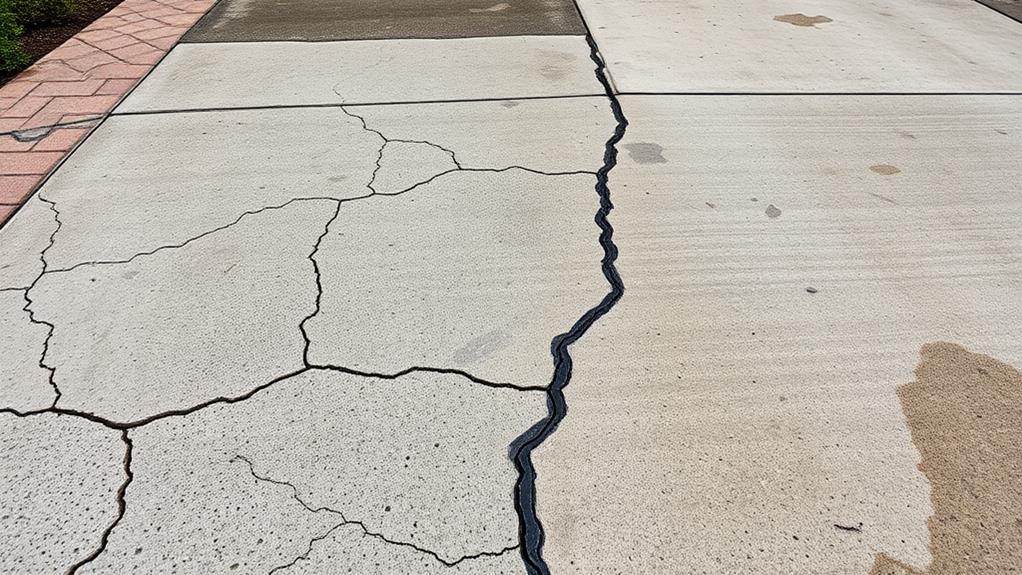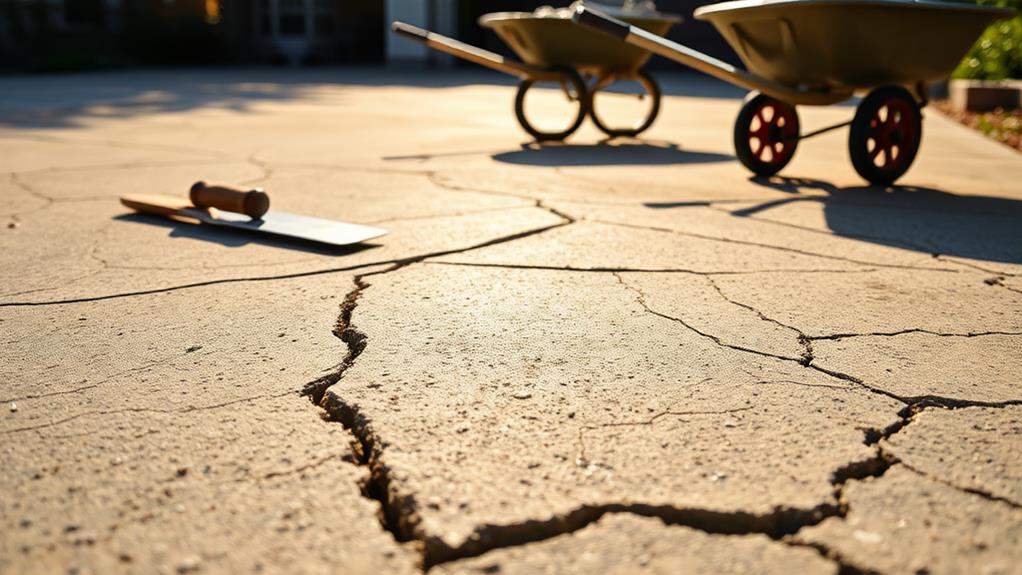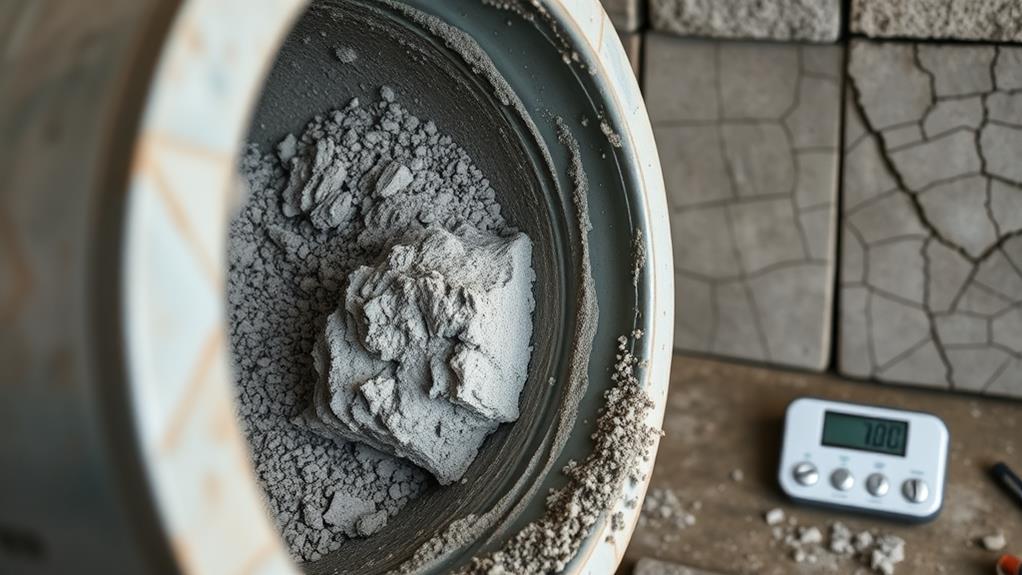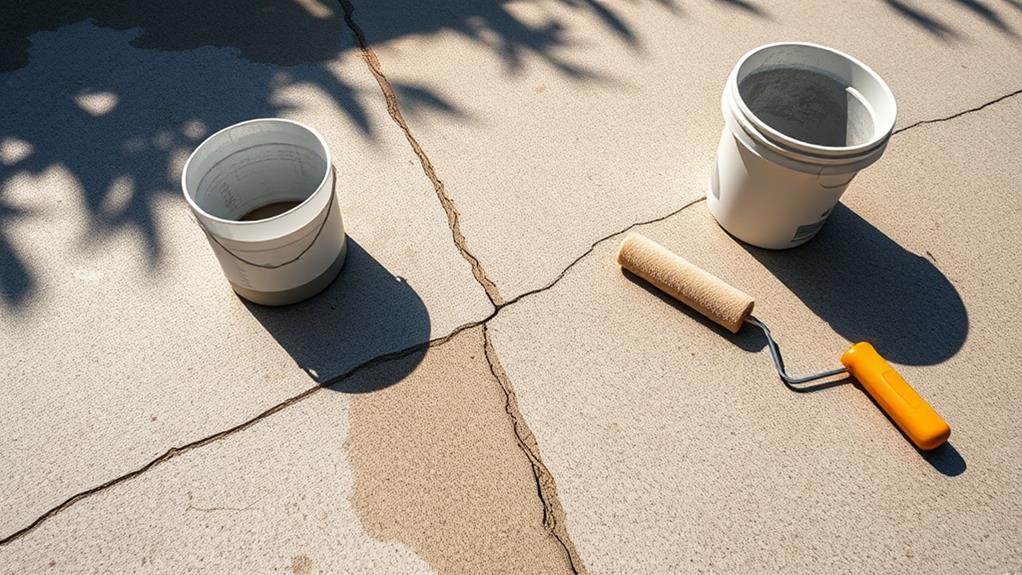Common Mistakes to Avoid During Concrete Driveway Installation

You've decided to install a concrete driveway, but are you aware of the common pitfalls that can turn your investment into a costly mistake? From improper site preparation to neglecting essential maintenance steps, there's a myriad of errors that can compromise the longevity and appearance of your driveway. Understanding these potential missteps isn't just about avoiding immediate problems; it's about ensuring your driveway stands the test of time. Whether you're a DIY enthusiast or planning to hire professionals, knowing what to watch out for can make all the difference in achieving a durable, attractive concrete surface that enhances your property's value.
Concrete Contractor Highlights
- Inadequate site preparation, including poor soil compaction and failure to install proper drainage systems.
- Using a substandard concrete mix with incorrect water-cement ratio or improper aggregate proportions.
- Insufficient reinforcement and improper formwork, leading to structural weaknesses in the driveway.
- Neglecting proper curing and finishing techniques, resulting in surface defects and reduced durability.
- Lack of long-term maintenance planning, including regular cleaning, sealing, and prompt repair of minor damage.
Concrete Contractor Services Residential And Commercial

Our experienced concrete contractors offer thorough services for both residential and commercial properties, specializing in high-quality concrete driveway installation. We handle every aspect of the project, from initial site preparation and formwork to pouring, finishing, and curing the concrete.
Our team utilizes state-of-the-art equipment and techniques to maintain durability, proper drainage, and aesthetic appeal. Committed to excellence, we employ premium-grade materials and adhere strictly to quality control protocols to assure long-lasting results.
We work closely with clients to customize designs, incorporate decorative elements, and select the right concrete mix for their specific needs and local climate conditions. With our expertise in both residential and commercial projects, we can tackle driveways of any size or complexity, providing long-lasting results that enhance property value and curb appeal.
Proper Concrete Mix Ratio

When preparing your concrete mix for a driveway installation, you'll need to pay close attention to three critical factors that can greatly impact the final result. First, achieving the correct water-cement ratio is essential, as too much or too little water can compromise the concrete's strength and durability.
Second, ensuring proper aggregate proportions is vital for creating a well-balanced mix that will provide optimal structural integrity and surface finish. Choosing an appropriate finish can also enhance curb appeal by seamlessly integrating the driveway with landscaping.
Incorrect Water-Cement Ratio
Why is the water-cement ratio so indispensable in concrete mixing? It's the cornerstone of your driveway's strength and durability. When you're part of the concrete pouring community, you'll quickly learn that too much water weakens the mix, while too little makes it unworkable. Getting this balance right is crucial for achieving the optimal consistency and performance of your concrete.
An incorrect water-cement ratio can lead to a host of problems that you'll want to avoid. Excess water increases the porosity of the concrete, making it more susceptible to cracking, scaling, and reduced compressive strength. It can also result in segregation of materials, where heavier particles settle to the bottom, compromising the overall integrity of your driveway.
Conversely, insufficient water can create a mix that's difficult to pour and finish, potentially leading to honeycombing and poor surface quality. To guarantee you're on the right track, it's essential to follow the manufacturer's guidelines for the specific cement you're using. Remember, the ideal water-cement ratio typically falls between 0.45 and 0.60 by weight, depending on the desired strength and workability of your concrete mix.
Improper Aggregate Proportions
Just as the water-cement ratio is essential, the proper proportioning of aggregates in your concrete mix plays a pivotal role in your driveway's quality. Aggregates, which include sand, gravel, and crushed stone, constitute the bulk of your concrete mix and significantly influence its strength, workability, and durability. When you're preparing your mix, it's imperative to maintain the correct balance between fine and coarse aggregates.
Improper aggregate proportions can lead to a host of issues. If you use too much fine aggregate, your concrete may become sticky and difficult to work with, potentially resulting in surface defects. Conversely, an excess of coarse aggregate can make the mix harsh and prone to segregation, compromising the driveway's structural integrity. To achieve the ideal mix, you'll need to contemplate factors such as the maximum size of coarse aggregate, which should generally not exceed one-third of the slab thickness. Additionally, the gradation of aggregates should be carefully controlled to guarantee optimal particle packing and minimize voids. By adhering to industry-standard mix design guidelines and consulting with experienced professionals, you'll be better equipped to create a durable, long-lasting concrete driveway that meets your expectations.
Neglecting Admixture Considerations
While many homeowners focus on the basic ingredients of concrete, they often overlook the crucial role of admixtures in enhancing their driveway's performance. These chemical additives can significantly improve your concrete's durability, workability, and resistance to environmental factors. By neglecting admixture considerations, you're missing out on opportunities to tailor your driveway's properties to your specific needs and local climate conditions.
Admixtures such as water reducers can enhance the concrete's strength while maintaining workability, even with less water in the mix. Air-entraining agents introduce tiny air bubbles, improving freeze-thaw resistance in colder climates. Accelerators and retarders can adjust setting times to accommodate various weather conditions during installation. Superplasticizers increase flowability without compromising strength, which is particularly useful for complex driveway designs or when pumping concrete long distances. Corrosion inhibitors protect embedded steel reinforcement, extending your driveway's lifespan. To guarantee the most appropriate admixtures for your project, consult with a concrete specialist. By incorporating these additives judiciously, you'll create a driveway that not only meets but exceeds your expectations in terms of longevity, appearance, and functionality.
Benefits

When you choose a concrete driveway, you're investing in a range of benefits that extend far beyond its primary function. Concrete driveways have a durable performance, making them more resistant to cracks, potholes, and weathering compared to asphalt. You'll appreciate the increased property value, exceptional durability, and minimal maintenance requirements that come with this robust installation.
In addition, concrete driveways offer diverse aesthetic appeal options, allowing you to customize the look to complement your home's exterior while enjoying the long-lasting performance of this resilient material.
Increased Property Value
Curb appeal plays a significant role in boosting your property's value, and a well-installed concrete driveway can be a game-changer. When you invest in a professionally crafted concrete driveway, you're not just enhancing your home's aesthetics; you're making a smart financial decision. A high-quality concrete driveway can increase your property's market value by up to 10%, making it an attractive feature for potential buyers.
You'll find that a well-maintained concrete driveway creates a lasting impression, setting your home apart in a competitive real estate market. It's not just about looks; durability matters too. Concrete's longevity means you're offering future homeowners a low-maintenance, long-lasting feature. This can be a significant selling point, as buyers often seek properties that require minimal upkeep.
Additionally, a concrete driveway's versatility in design options allows you to complement your home's architecture, further enhancing its overall appeal. By choosing stamped or colored concrete, you can create a unique, custom look that adds character and charm to your property. Remember, when it comes to home improvements, a concrete driveway is an investment that pays dividends in both curb appeal and resale value.
Durability and Longevity
Concrete's rock-solid reputation for durability and longevity makes it an unbeatable choice for driveways. When properly installed and maintained, your concrete driveway can last for decades, withstanding the harsh elements and heavy traffic that come with daily use. This resilience guarantees that you'll be part of an exclusive group of homeowners who don't have to worry about frequent replacements or repairs.
The strength of concrete lies in its ability to distribute weight evenly, preventing cracks and potholes that plague other materials. You'll appreciate how it maintains its structural integrity even under the pressure of heavy vehicles. Additionally, concrete's resistance to oil, gasoline, and other automotive fluids means you won't have to contend with unsightly stains marring your driveway's surface. With minimal upkeep, such as occasional power washing and sealing, you'll preserve your driveway's appearance and functionality for years to come. This longevity not only saves you money in the long run but also provides peace of mind, knowing that your investment will stand the test of time and continue to enhance your property's value and curb appeal.
Low Maintenance Requirements
Three key benefits make concrete driveways a low-maintenance dream. First, you'll appreciate the minimal upkeep required, as concrete's smooth surface resists staining and is easily swept clean. Second, you won't need to worry about frequent repairs or replacements, as concrete's durability certifies it can withstand heavy vehicles and harsh weather conditions for decades. Third, you'll save time and money in the long run, as concrete doesn't require regular sealing or refinishing like other materials.
To maximize these benefits, it's essential to avoid common installation mistakes. Guarantee proper soil compaction and reinforcement to prevent cracking and settling. Additionally, use the correct concrete mix and curing techniques to achieve prime strength and longevity. Don't forget to incorporate adequate drainage to prevent water pooling, which can lead to deterioration over time.
Aesthetic Appeal Options
Surprisingly, concrete driveways offer a wide array of aesthetic options to enhance your home's curb appeal. You're not limited to a plain gray slab; instead, you can choose from various textures, colors, and patterns that complement your home's architecture and landscaping. By exploring these options, you'll create a driveway that not only serves its functional purpose but also becomes an integral part of your property's overall design.
Consider stamped concrete, which can mimic the appearance of brick, stone, or even wood planks. This technique allows you to achieve a high-end look without the associated maintenance of these materials. Alternatively, you might opt for exposed aggregate, where the top layer of cement is removed to reveal the decorative stones beneath, creating a unique, textured surface.
Color options abound as well, from subtle earth tones to bold hues that make a statement. You can even incorporate multiple colors to create intricate designs or borders. By carefully selecting the right combination of texture, pattern, and color, you'll elevate your driveway from a mere utilitarian feature to a striking design element that enhances your home's overall aesthetic.
Driveway Sealing and Maintenance Tips

To maintain your concrete driveway's longevity and appearance, you'll need to implement proper sealing techniques, employ regular cleaning methods, and address cracks promptly. Your driveway's durability hinges on a consistent maintenance routine that includes sealing to protect against moisture and stains, cleaning to prevent the buildup of harmful substances, and repairing minor cracks before they escalate into major issues. By following these essential maintenance tips, you can guarantee your concrete driveway remains a functional and aesthetically pleasing asset to your property for years to come.
| Maintenance Task | Frequency | Benefits |
|---|---|---|
| Sealing | Every 2-5 years | Protects against moisture, stains, and UV damage |
| Cleaning | Monthly | Prevents buildup of dirt, oil, and harmful chemicals |
| Crack Repair | As needed | Stops small cracks from becoming major structural issues |
Proper Sealing Techniques
Sealing your concrete driveway is a vital step in maintaining its longevity and appearance. To guarantee optimal protection, it's imperative to follow proper sealing techniques.
Begin by thoroughly cleaning the surface, removing any dirt, oil, or debris that could interfere with the sealant's adhesion. Once clean, allow the driveway to dry completely before proceeding.
When selecting a sealant, choose a high-quality product specifically designed for concrete driveways. Apply the sealant using a roller or sprayer, working in small sections to ensure even coverage. It's important to apply thin, uniform coats rather than a single thick layer, as this will promote better absorption and prevent pooling. Allow each coat to dry fully before applying subsequent layers.
Pay close attention to the weather conditions during application, as temperature and humidity can affect the sealant's performance. Ideally, apply the sealant on a dry day with moderate temperatures. After application, protect the newly sealed surface from foot traffic and vehicles for at least 24 hours to allow proper curing. By following these techniques, you'll maximize the effectiveness of your driveway's seal, guaranteeing long-lasting protection against moisture, stains, and wear.
Regular Cleaning Methods
Regular cleaning of your concrete driveway is essential for maintaining its appearance and extending its lifespan. To keep your driveway in top condition, you'll need to implement a consistent cleaning routine. Start by removing debris and loose dirt with a broom or leaf blower, guaranteeing that you've cleared the entire surface.
For more stubborn stains, you'll want to use a pressure washer with a fan tip nozzle, working in sections and maintaining a consistent distance from the concrete to avoid damage.
For oil or grease stains, apply a specialized concrete cleaner or degreaser, allowing it to sit for the recommended time before scrubbing with a stiff-bristled brush. Rinse thoroughly with clean water, being careful not to let the dirty water pool on the surface.
For organic stains like mold or mildew, use a solution of one part bleach to three parts water, applying it with a pump sprayer and letting it sit for 15 minutes before rinsing. Remember to wear protective gear and avoid letting cleaning solutions run off into your lawn or storm drains.
Addressing Cracks Promptly
One of the most crucial aspects of concrete driveway maintenance is addressing cracks promptly. When you notice even the smallest fissure in your driveway, it's indispensable to take action immediately. These seemingly insignificant cracks can quickly escalate into larger problems, compromising the integrity of your entire driveway structure.
By addressing these issues early, you'll not only preserve the aesthetic appeal of your property but also prevent more extensive and costly repairs down the line.
To effectively address cracks, you'll need to thoroughly clean the affected area, removing any debris or loose concrete. Once clean, apply a high-quality concrete crack filler, ensuring it penetrates deeply into the fissure. For larger cracks, you may need to use a concrete patching compound.
After the filler or compound has dried, it's necessary to seal the entire driveway surface to protect it from further damage. This process involves applying a concrete sealer, which will help prevent moisture infiltration and reduce the likelihood of future cracking. By diligently maintaining your concrete driveway and addressing cracks promptly, you'll extend its lifespan and maintain its value for years to come.
Concrete Contractor FAQ
How Long Should I Wait Before Parking on a New Concrete Driveway?
You'll want to wait at least 7 days before parking on your new concrete driveway. It's best to give it a full 28 days to reach maximum strength. Your patience will pay off with a long-lasting, durable surface.
Can I Install a Concrete Driveway Over an Existing Asphalt Surface?
You can install concrete over asphalt, but it's not ideal. You'll face potential cracking and drainage issues. Instead, consider removing the old surface. It's more work, but you'll get better results for your driveway project.
What's the Ideal Thickness for a Residential Concrete Driveway?
You'll want your residential concrete driveway to be 4 inches thick for standard vehicles. If you're expecting heavier traffic, like RVs or trucks, consider going up to 5 or 6 inches for added strength and durability.
How Can I Prevent Cracks in My Concrete Driveway During Winter?
You'll want to protect your driveway from winter's harsh effects. Use a quality sealer, avoid deicing chemicals, and clear snow promptly. Don't forget to properly cure the concrete when it's first poured. We're all in this together!
Are There Environmentally Friendly Options for Concrete Driveway Installation?
Yes, you've got eco-friendly options for your driveway! You can use pervious concrete, recycled aggregates, or geopolymer concrete. These choices reduce environmental impact and show you care about sustainability. Your neighbors will appreciate your green approach!
